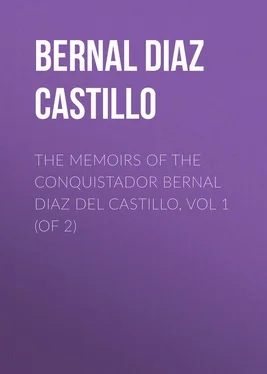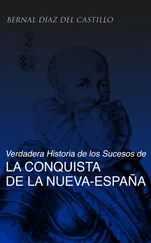Bernal Díaz del Castillo - The Memoirs of the Conquistador Bernal Diaz del Castillo, Vol 1 (of 2)
Здесь есть возможность читать онлайн «Bernal Díaz del Castillo - The Memoirs of the Conquistador Bernal Diaz del Castillo, Vol 1 (of 2)» — ознакомительный отрывок электронной книги совершенно бесплатно, а после прочтения отрывка купить полную версию. В некоторых случаях можно слушать аудио, скачать через торрент в формате fb2 и присутствует краткое содержание. Жанр: foreign_antique, foreign_prose, на английском языке. Описание произведения, (предисловие) а так же отзывы посетителей доступны на портале библиотеки ЛибКат.
- Название:The Memoirs of the Conquistador Bernal Diaz del Castillo, Vol 1 (of 2)
- Автор:
- Жанр:
- Год:неизвестен
- ISBN:нет данных
- Рейтинг книги:3 / 5. Голосов: 1
-
Избранное:Добавить в избранное
- Отзывы:
-
Ваша оценка:
- 60
- 1
- 2
- 3
- 4
- 5
The Memoirs of the Conquistador Bernal Diaz del Castillo, Vol 1 (of 2): краткое содержание, описание и аннотация
Предлагаем к чтению аннотацию, описание, краткое содержание или предисловие (зависит от того, что написал сам автор книги «The Memoirs of the Conquistador Bernal Diaz del Castillo, Vol 1 (of 2)»). Если вы не нашли необходимую информацию о книге — напишите в комментариях, мы постараемся отыскать её.
The Memoirs of the Conquistador Bernal Diaz del Castillo, Vol 1 (of 2) — читать онлайн ознакомительный отрывок
Ниже представлен текст книги, разбитый по страницам. Система сохранения места последней прочитанной страницы, позволяет с удобством читать онлайн бесплатно книгу «The Memoirs of the Conquistador Bernal Diaz del Castillo, Vol 1 (of 2)», без необходимости каждый раз заново искать на чём Вы остановились. Поставьте закладку, и сможете в любой момент перейти на страницу, на которой закончили чтение.
Интервал:
Закладка:
CHAPTER XXVI
Cortes reviews his troops, and what further happened.
On the third day after our arrival at Cozumel, Cortes reviewed the whole of his troops. Without counting the pilots and marines, our number amounted to 508 men. There were 109 sailors, and sixteen horses, which were trained equally for tournaments or for war. Our squadron consisted of eleven vessels of different tonnage; among these, one was a kind of brigantine, the property of a certain Gines Nortes. The number of crossbow men was thirty-three, and of musketeers thirteen: add to this our heavy guns and four falconets, a great quantity of powder and balls. As to the precise number of crossbow men I cannot exactly swear, though it matters not whether there were a few more or less.
After this review, Cortes ordered the artillerymen Mesa, Bartolome de Usagre, Arbenga, and a certain Catalonier whose name I forget, to keep all our firearms bright and in good order, to see that each cannon had its right-sized ball, to prepare the cartridges, and distribute the powder properly. The chief care of our gun department he confided to a certain Francisco de Oroze, who had proved himself a brave soldier in the Italian wars. Juan Benitez and Pedro de Guzman had to inspect the crossbows, and see that they were supplied with two or three nuts and as many cords. They had also to superintend the exercise of shooting at the target, and the breaking-in of our horses, particularly to accustom them to the noise of our firearms. I have now said sufficient of our armament: indeed, Cortes was most particular with the merest trifles in these matters.
CHAPTER XXVII
Cortes receives information that two Spaniards are in the power of the Indians at the promontory of Cotoche: the steps he took upon this news.
As Cortes paid attention to every circumstance, he ordered myself and Martin Camos of Biscay into his presence, and asked us what our opinion was of the word Castilan , Castilan , which the Indians of Campeachy had so often repeated when we landed there, under the command of Hernandez de Cordoba.
We again informed him of every circumstance that had there taken place. He said, he had often turned this matter over in his mind, and could not help thinking but that the inhabitants must have some Spaniards among them, and he thought it would not be amiss to question the caziques of Cozumel upon this head. This Cortes accordingly did, and desired Melchorejo, who by this time had gained some little knowledge of the Spanish, and perfectly understood the language of Cozumel, to question the chiefs about it. Their several accounts perfectly corresponded; and they satisfactorily proved that there were several Spaniards in the country, whom they had seen themselves; that they served the caziques, who lived two days' march inland, as slaves, and that it was only a few days ago some Indian merchants had spoken with them.
We all felt overjoyed at this news. Cortes told these chiefs that he would send the Spaniards letters, which they call amales in their language, in which he would desire them to come to us. The cazique and other Indians who undertook to forward these letters were most kindly treated by Cortes, who gave them all kinds of presents, and promised them more on their return. Upon which the cazique remarked to Cortes, that it would be necessary to send a ransom to the chiefs whom the Spaniards served as slaves before they would let them go. Various kinds of glass beads were therefore given to the messengers for this purpose, and Cortes sent two of the smaller vessels, armed with twenty crossbow men and a few musketeers, under command of Diego de Ordas, to the coast of Cotoche, with orders to remain there for eight successive days with the larger of the two vessels, and to send him information from time to time by the other vessel, while the messengers brought letters to and fro; for the distance to the promontory of Cotoche from this place was only nine miles, the whole appearing, moreover, to form but one country. The following were the contents of the letter which Cortes wrote to the Spaniards:
"Dear Sirs and Brothers, – Here, on the island of Cozumel, I received information that you are detained prisoners by a cazique. I beg of you to come here to me on the island of Cozumel. To this end I have sent out an armed ship, and ransom-money, should it be required by the Indians. I have ordered the vessel to remain stationary off the promontory of Cotoche for eight days, to wait for you. Come as speedily as possible; you may depend upon being honorably treated by me. I am here with eleven vessels armed with 500 soldiers, and intend, with the aid of the Almighty and your assistance, to proceed to a place called Tabasco, or Potonchon; etc."
With this letter the two Indian merchants embarked on board our vessel, which passed this narrow gulf in three hours, when the messengers with the ransom-money were put on shore.
After the lapse of a couple of days they actually handed over the letter to one of the Spaniards in question, who, as we afterwards learnt, was called Geronimo de Aguilar, and I shall therefore in future distinguish him by that name. When he had read the letter and received the ransom-money we had forwarded, he was exceedingly rejoiced, and took the latter to the cazique his master to beg for his liberation. The moment he had obtained this he went in quest of his comrade, Gonzalo Guerrero, and made him acquainted with all the circumstances; when Guerrero made the following reply:
"Brother Aguilar, – I have united myself here to one of the females of this country, by whom I have three children; and am, during wartime, as good as cazique or chief. Go! and may God be with you: for myself, I could not appear again among my countrymen. My face has already been disfigured, according to the Indian custom, and my ears have been pierced: what would my countrymen say if they saw me in this attire? Only look at my three children, what lovely little creatures they are; pray give me some of your glass beads for them, which I shall say my brethren sent them from my country."
Gonzalo's Indian wife followed in the same strain, and was quite displeased with Aguilar's errand. "Only look at that slave there, (said she,) he is come here to take away my husband from me! Mind your own affairs, and do not trouble yourself about us."
Aguilar, however, afterwards made another attempt to induce Gonzalo to leave, telling him to consider that he was a Christian, and that he ought not to risk the salvation of his soul for the sake of an Indian woman. Moreover, he might take her and the children with him if he could not make up his mind to separate himself from them. Aguilar, however, might say what he liked, it was all to no purpose; he could not persuade Gonzalo to accompany his heretofore companion in good and ill fortune. This Guerrero was most probably a sailor, and a native of Palos. 10 10 Palos, a small town of Spain, lying on the river Tinto. This port produced the best Spanish sailors during the early voyages of discovery, and here also the expedition under Columbus was fitted out. (p. 60 .)
He remained among the Indians, while Geronimo de Aguilar alone took his departure with the Indian messengers, and marched towards the coast where our ship was to have waited for them: but she had left; for De Ordas, after staying there the eight days, and another in addition, finding that no one appeared, again set sail for Cozumel. Aguilar was quite downcast when he found the ship was gone, and he again returned to his Indian master.
Ordas, however, did not meet with the best of reception when he returned without the ransom-money or any information respecting the Spaniards, and even without the Indian messengers. Cortes said to him, with great vehemence, he expected he would have fulfilled his commission better than to return without the Spaniards, and even without bringing him any information respecting them, although well aware they were staying in that country. Cortes had, moreover, just that moment been greatly put out by another circumstance. A soldier, called Berrio, had accused some sailors of Gibraleon of having stolen from him a couple of sides of bacon, which they would not return. They positively denied that they had committed the robbery, and even took an oath to that effect; however, after a good search, the bacon was found among their clothes. There were seven sailors who had been concerned in the robbery, and Cortes, notwithstanding their officers interceded in their behalf, ordered them to be severely whipped.
Читать дальшеИнтервал:
Закладка:
Похожие книги на «The Memoirs of the Conquistador Bernal Diaz del Castillo, Vol 1 (of 2)»
Представляем Вашему вниманию похожие книги на «The Memoirs of the Conquistador Bernal Diaz del Castillo, Vol 1 (of 2)» списком для выбора. Мы отобрали схожую по названию и смыслу литературу в надежде предоставить читателям больше вариантов отыскать новые, интересные, ещё непрочитанные произведения.
Обсуждение, отзывы о книге «The Memoirs of the Conquistador Bernal Diaz del Castillo, Vol 1 (of 2)» и просто собственные мнения читателей. Оставьте ваши комментарии, напишите, что Вы думаете о произведении, его смысле или главных героях. Укажите что конкретно понравилось, а что нет, и почему Вы так считаете.












